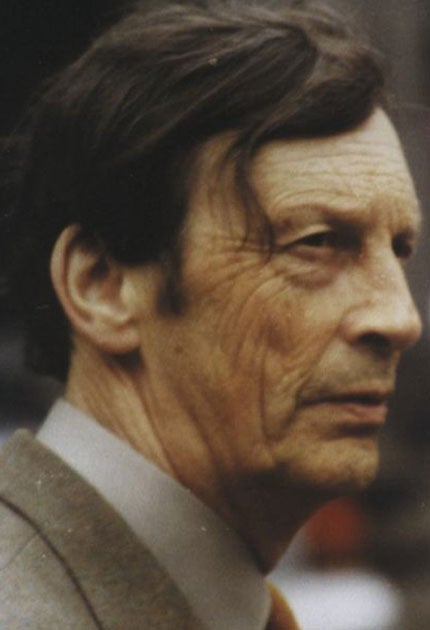Geoffrey Dutton: Poet and scientist who straddled the ‘two cultures’ with ease

"Now that I am about to go under the sod," Geoffrey Dutton remarked a few years ago, "I find when I look back I'm glad, as I wrote in one poem, that at one time, I tried to compose music. No more than that. It's nice to be able to believe that you had tried to compose music."
Also a notable gardener in arduous terrain for 50 years, Geoffrey Dutton never dug himself into a rut; on the contrary, his work in biochemistry, and in particular glucuronic acid, sprang from a continual interest in the world around him. While that work led to the saving of many young lives, his other interests survive beyond the sod not only in his poems but in a series of books which describe his mountaineering, his extraordinary garden and the wild swimming he loved, in which, as he wrote, "you are able to say goodbye entirely to the physical and mental norms by which you live". As Diana Ross (the other one) pointed out in her volume of encounters with notable gardeners, he published poetry as GF Dutton (which distinguished him from the Australian poet Geoffrey Dutton) and worked scientifically as GJF Dutton DSc LLD FRSE.
Geoffrey Dutton was born in 1924 in Chester. By the time he graduated in biochemistry from Edinburgh in 1948, he was not one to see any difference between the "two cultures" – the arts and the sciences – which were to excite so much national discussion in the following decade; although he was not always enamoured of Aldous Huxley, he saw that in the title of the novelist's last work, Literature and Science, the emphasis was on the conjunction – and that in both poetry and science it takes time for people to appreciate the new.
In working on his PhD, about the synthesising of glucuronic acid, at St Andrew's, and then teaching for the rest of his career at Dundee, Dutton came to find a poetry in data itself, and was later to say that his unpopulated poetry was also a retreat from the hurly-burly of studies rooted in the way that the animal body rids itself of toxins by way of forming a compound with glucuronic acid (in particular, he found that infants' metabolism deals with drugs at a different rate from adults', a discovery which had a profound effect on children's surgery).
For all that, his sympathies were wide: he said of one poet, Edith Sitwell, that "Leavis had no sense of the music of language, none whatever. The early poems of Edith Sitwell are good early poems; they're musical; he had no idea about them at all, banished the whole lot with his usual rudeness".
It was only in 1977, when encouraged by a poet in residence at the university, Anne Stevenson, that Dutton began to collect his poems, as 31 Poems. He had always kept himself distinct from other poets, and from the meanderings and maunderings of "the literary life". His work's dense forms displayed concerns that would have struck a chord in the Auden of In Praise of Limestone and showed his immersion in such Americans as William Carlos Williams; he also found an affinity with Scandinavian writers. Although Dutton observed that one attraction of poetry was that "prose takes a long time to get there", he became a ready exponent of it.
He did not regard his single-handed work on eight acres of remote, often extremely cold Perthshire land north of Blairgowrie as "gardening" but as "guiding", and he abominated greenhouses as redolent of factory life: he did not want his efforts to make the place look at odds with the terrain beyond, and called this approach "marginal" gardening. That was a modest term for somewhere which brought him wide attention: it featured on television but was not open to the public: as Diana Ross observed, his suspension bridge, for one thing, would have brought a gleam to the eye of any health and safety officer. He took an idiosyncratic view of it all, calling hogweed "entertaining and harmless" and was always amused that visitors thought the small stone huts built for his mowers were the remnants of an ancient civilisation.
As he once said, "a human must explore; it's like an animal out of a cage, it sniffs here and there, and if it doesn't want to sniff any more, it's a dead animal. I've always sniffed as much as I could, beyond the cage". Although his scientific work will remain the province of specialists, there will be a growing audience for such precisely observed books as his droll garden studies in Harvesting the Edge (1995) and Some Branch Against the Sky (1997). His two volumes about mountaineering with companions, The Ridiculous Mountains (1984) and Nothing so Simple as Climbing (1993) were combined as The Complete Doctor Stories (1999) while his long-distance aquatic forays brought Swimming Free (1972). His poems are now most readily available, in selected and augmented form, as The Bare Abundance (2002).
Geoffrey John Fraser Dutton, scientist and poet: born Chester 30 December 1924; married (two sons, one daughter); died 1 June 2010.
Join our commenting forum
Join thought-provoking conversations, follow other Independent readers and see their replies
Comments
Bookmark popover
Removed from bookmarks